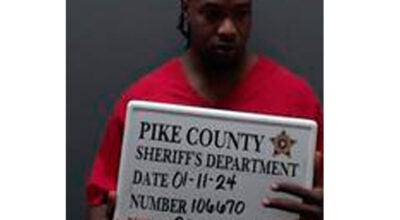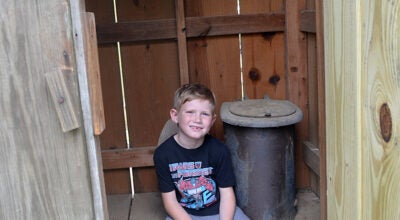tellin’ tales
Published 1:12 am Sunday, February 1, 2009
Somewhere between “the “buck-naked bear and the bare-naked Buck” and the brother Wilson who “tortured” Kathryn Tucker Windham as a child, Joann and Charles Rouse were smitten.
“This is just fantastic,” she said. “We’re just delighted we came.”
The Rouses were among the full house who gathered at the We Piddle Around Theatre Friday night for the opening of the Pike Piddlers Storytelling Festival. Fans of the theater’s “Come Home It’s Suppertime” production, the Rouses had received tickets to the storytelling festival as a Christmas present. They came primarily to hear Windham, Alabama’s own nationally acclaimed storyteller.
But they left with a newfound appreciation for all the participating artists, including Bil Lepp, a five-time champion of the West Virginia Liars Contest; Donald Davis, a Storytelling Circle of Excellence Award recipient and one of the most sought-after storytellers in the country; and Carmen Deedy, an award-winning recording artist and author of numerous best-selling books for children who has performed at places as varied as the Kennedy Center and the Disney Institute. Joining these storytellers on Saturday evening was newcomer Aleta
Davis, who combined a monologue and song for her performance.
And Deedy, for one, isn’t surprised by audiences’ reactions to their first storytelling event.
“Stories are our human connective tissue,” she said, adding that stories and oral tradition are as old as fire and as important to humans evolution.
“If you can hear someone’s story, you can became to understand him or her,” she said. “You know, you might say ‘I never liked a Catholic, until I hear Jim’s story.’”
Deedy, who had performed for elementary students earlier in the day, capped the evening’s performances with a story she titled “Qualities of Mercy.” It was the tale of her sixth-grade principal, Dr. Joyce Paris, a woman described as a place “where all levity went to die.”
Through tales of Dr. Paris’ intimidating demeanor to Deedy’s own impetuous actions as a child to their meeting again when Deedy was an adult, the storyteller captivated the audience and left them, if not with a moral, at least with an appreciation for those who’ve touched our lives along the way.
“Not every story has to have a moral,” she said.
Deedy, like most of the others, developed her ear for stories early in life.
“Every one of us grew up in small towns and communities that promote story telling,” she said. “We heard it in our preaching, in our family reunions, at the Piggly Wiggly.”
As an author, she stumbled into storytelling as a profession. “I’d go to book readings with children and ask them, ‘do you like stories?’ and then, ‘does anybody tell you stories?’”
That art, she soon found, was being lost on the younger generations.
“We all have stories to tell,” Windham said. “And we need to tell them.”
Windham’s stories are simple ones, retelling the antics of an older brother who lived to torture her. “He’d sit beside me and say, ‘I’m tired of living. I think I’ll stop breathing’… I’d just cry and cry and bet him not to” or a live-in aunt whose Southern upbringing wouldn’t allow her to be rude to a guest. Instead, lines like “Well, just help yourself to the salt and pepper” became part of the family’s lexicon, a tribute to Aunt Beth and her sense of decorum each time it is repeated.
“In the South, we’re not embarrassed by our peculiar relatives,” Windham told the audience. “We trot them out and tell stories about them.”
And while Davis, known as the dean of American storytellers, didn’t trot out any peculiar relatives, he confessed to some boyish antics in his “Watch the Baby” story that rung true with every older brother, and younger one, in the audience. “Who said I wanted another baby?” he quipped, as the audience roared.
Lepp, who is participating for the first time in the Pike Piddlers festival, said that immediate reaction from audience members is part of the joy of being a storyteller. “We as storytellers have an advantage that other artists don’t,” he said. “We get to see our audience react, and we get to see it first hand.”




